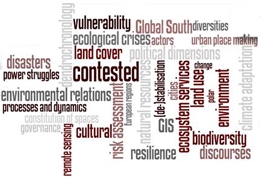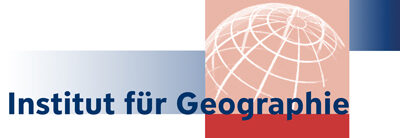Cultural Geography
 The main research areas of cultural geography at the FAU in Erlangen are embedded in a conceptual framework, which is captioned by “Contested Geographies”. From this perspective, geographies are conceived and analysed as “cultural”, that is to say as socially constituted, negotiated and thus often controversial.
The main research areas of cultural geography at the FAU in Erlangen are embedded in a conceptual framework, which is captioned by “Contested Geographies”. From this perspective, geographies are conceived and analysed as “cultural”, that is to say as socially constituted, negotiated and thus often controversial.
Research foci
Development research makes use of a wide range of instruments in its empirical case studies at all levels. At the same time, there is also the demand for a conceptual location of the empirical studies. On the one hand, this means that we orient ourselves to (more recent) theoretical models and concepts. On the other hand, our projects should ideally also contribute to the further development of theoretical concepts or eliminate explanatory deficits. The theory orientation is complemented by references to development practice: By trying to expose and question different perspectives and to empirically substantiate development processes, we can ideally point out ways for problem solutions to stakeholders and decision-makers in development cooperation and policy. We are always aware of the problem of the concept of development. Such understood geographic development research works in a committed and practical way, but with clear theoretical references.
Social conflicts in the urban area, demographic change, cross-border integration, economic structural change are important topics of our work. In urban areas, social changes are concentrated in a special way. Globalization effects, social fragmentation, socio-cultural diversity and the question of the “just city” are as much in the focus of our research as aspects of cultural change and processes of urban planning, urban development and urban policy. In more rural areas, demographic change, regional economic cycles and economic structural change are at the forefront of our research activities.
In this Erlangen research focus basic research and the work of applied geography complement each other to a special degree. Cooperation with public authorities and planning institutions is close here.
This perspective finds application in various fields of research, for example in the exploration of the political dimensions of cartography and the geoweb, in the analysis of geopolitical models, in the analysis of processes of European integration and Europeanization, in questions of migrations, identities and spaces as well as in the critical analysis of processes of securitization and culturalization of city policies.
Conceptually, our approaches are diverse. Particular importance is attached to poststructuralist approaches, especially in the field of theories of discourse and hegemony as well as postcolonial studies . In doing so, we examine the constitution of geographies in linguistic-discursive processes as well as increasingly the role of (non-linguistic) practices and socio-technical arrangements. In addition, institution-based approaches (institutional mapping, process tracing) play an important role.





